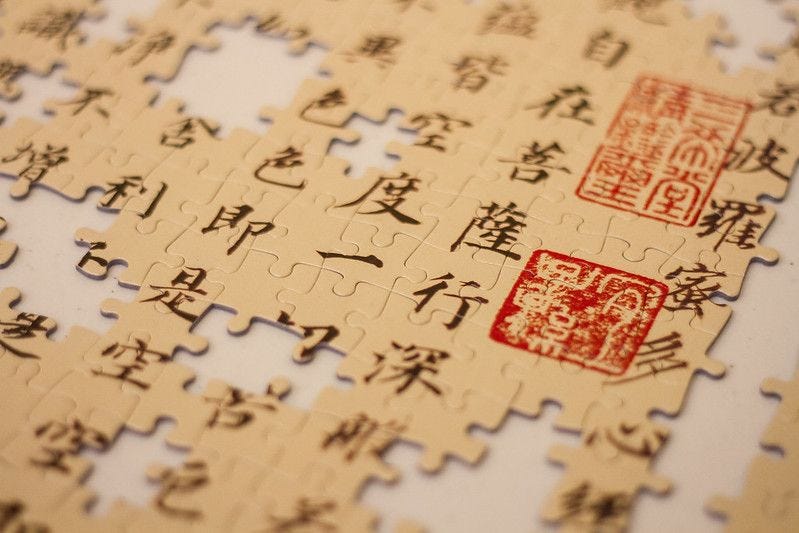The Heart Sutra: An Interlinear Translation
'No emerging, no ceasing. No defilement, no purity. No increase, no decrease.'
Translated by Thomas Sullivan, 2023.
(The Heart Sutra Puzzle, photograph by 董其昌, CC BY-SA 2.0)
This work is licensed under a Creative Commons Attribution 4.0 International License.
Note for Substack readers: This post includes the full English translation, but Substack cannot handle footnotes, so this does not include the full interlinear version with explanatory footnotes, which is only accessible on the original post on my website.
Introduction
Translating the Heart Sutra seems like a rite of passage for students of Literary Chinese and budding Buddhist studies scholars—and so, here is my first movement towards translating this complex, dense, text.
In order to have this new translation add something to the literature, I have split this translation into two sections: firstly, the translation by itself. Secondly, an interlinear version, with extensive footnotes, which will hopefully be helpful for others understanding the text and how I arrived at the decisions I made. This translation was made significantly easier by the fantastic line-by-line polyglot interlinear discussion by Kazuaki Tanahashi in their The Heart Sutra: A Comprehensive Guide to the Classic of Mahayana Buddhism (2014), which I reference in the foodnotes, and Paul W. Kroll’s A Student’s Dictionary of Classical and Medieval Chinese (2017). I did tell you I was a student of the language! I have intentionally avoided reading other translations during the process of creating this, similarities are unintentional. In a few cases, my translation clearly diverges from standard English renderings of this text.
I am also placing this translation under a Creative Commons license. This is important to me, not just because of a commitment to open access generally, but because there are few scholarly, recent translations of the Heart Sutra that can be reproduced without complex concerns about copyright.
My approach was to attempt a degree of literalism—translating double negatives and double affirmatives, using concise English phrasing when the Chinese is concise, and such. When Xuánzàng transliterates from Sanskrit, I also transliterate, with the exception of prajñā pāramitā, which I translate as “Perfection of Wisdom”. I translate non-transliterated Buddhist concepts that use “ordinary” Chinese characters into “ordinary” English, to give an impression of how the Chinese uses words that readers would encounter in other texts. For example, I translate 咒 as “incantation” rather than dhāraṇī or mantra, as it is a character used outside of translating Sanskrit. The exception to this rule is translating 法 as dharma, due to the many, many, implications of that word.
This is a translation of Xuánzàng’s translation of the Sutra: T251, as found in the SAT Daizokyo Text Database (2018) online. Line breaks are given at each of the punctuation marks, according to the SAT edition.
Translation
The Perfection of Wisdom Heart Sutra
Translated by Tripiṭaka Dharma-master Xuánzàng, of the Tang Dynasty.
Avalokiteśvara Bodhisattva,
while moving deeply in the Perfection of Wisdom,
saw brightly that the five aggregates are completely empty,
and crossed over completely from bitter restraints.
Shariputra,
Form is not different from emptiness.
Emptiness is not different from form.
Form is precisely such emptiness.
Emptiness is precisely such form.
Sensations, perceptions, mental formations, and consciousness, are also, again, just like this.
Shariputra,
Therefore, all dharmas have the mark of emptiness.
No emerging, no ceasing.
No defilement, no purity, no increase, no decrease.
For this reason, inside emptiness:
No form,
No sensation, perception, mental formation, or consciousness.
No eye, ear, nose, tongue, body, or mind.
No form, sound, smell, taste, touch, or dharma.
No eye-realm,
then through to no consciousness-realm.
No non-knowledge,
and no end to non-knowledge,
then through to no old age and death,
and no end to old age and death.
No suffering, accumulating, ceasing, or path,
no insight, and so no attainment.
By reason of non-attainment,
Bodhisattvas,
because they depend on the Perfection of Wisdom,
their heart is not ensnared or hindered.
Because it is not ensnared or hindered,
they do not have fear or terror,
distant from confusion and illusion,
fully reaching nirvāṇa.
In the three worlds, all Buddhas,
because they depend on the Perfection of Wisdom,
obtain anuttarāṃ samyaksambodhi [unexcelled correct awakening].
Therefore, know the Perfection of Wisdom is
this great divine incantation,
this great illuminating incantation, this unexcelled incantation,
this unequalled, never equalled, incantation,
which can expel all suffering,
because it is authentic truth, not hollow falsehood.
Express the Perfection of Wisdom incantation.
Precisely express the incantation thus:
gate gate pāragate pārasaṃgate
bodhi svāhā
The Perfection of Wisdom Heart Sutra.



